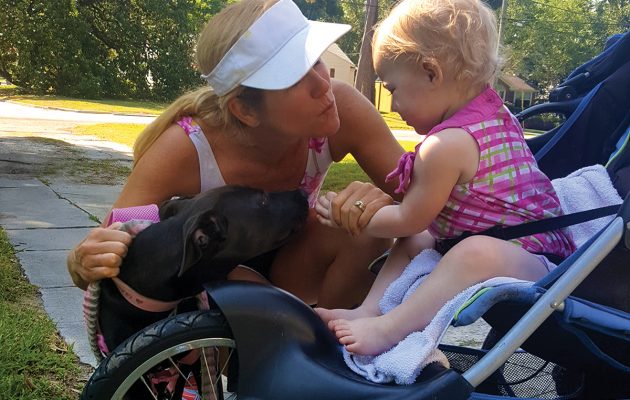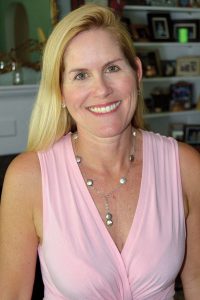Foster families get a break

The children call her “Mama Mia,” or “Miss Amelia,” and although she modestly says she’s not exceptional, there probably is a special place in heaven reserved for Amelia Frazer Day.
Over the past seven years, the stay-at-home mother of three has brought more than 50 foster care children into her Miramar home, filling in as a substitute parent when other foster parents need a break. As a respite foster specialist, she takes children – mainly babies or toddlers – for a day, a weekend, a week or two, or occasionally longer, so that foster parents can vacation or have a night off. Many of her young charges are repeat clients and have suffered from fetal alcohol syndrome, abuse, PTSD, or neglect. She loves each one, but without the attachment she feels for her own children.
“Some people say, ‘Oh my gosh, you’re such a saint,’ but I say, ‘Don’t say that!’ I say nurses are saints or a teacher is a saint. I used to do that, and I’m so thankful there are people out there willing to teach my kids because it’s a hard job,” said Day, a Bolles School graduate and former science teacher at School of Success (SOS) Academy on the Westside.
“Everybody has gifts, and I don’t expect anybody to do what I do,” she said. “I don’t feel like I’m special or closer to God for doing this. I just feel like I’m doing what God has asked me to do.”
It was at Christian Family Chapel in Mandarin that Day and her husband, Greg, got the idea of becoming involved with the foster care system. Greg had been interested in becoming a Boys and Girls’ Club mentor, and when the couple spotted a table set up by Florida Baptist Children’s Home at church, they decided to investigate becoming foster parents.
“Some people at church were taking classes and some were fostering,” Day explained. “When the music minister got up in front of the church and said he and his wife had foster-adopted a child, something happened in my heart. I knew Greg and I really liked kids. If Greg did the Boys’ and Girls’ Club he’d be off with somebody else’s kid. This was something we could do in our normal everyday life – opening our home up to a child.”
It took the Days six months to a year to get into the foster system, she said. As a couple, they took classes sponsored by Family Support Services and the Florida Baptist Children’s Home. They had their home inspected for lead and child-proofing and underwent a background check by the Jacksonville Sheriff’s Office as well as an in-depth “church” check because Florida Baptist Children’s Home wanted to place kids in Christian homes.
Day, who considers respite fostering her Christian ministry, can often be seen pushing a stroller in her neighborhood or taking the children to nearby San Marco playgrounds. Her foster children join her at neighborhood gatherings, her teenager’s soccer games, cookouts, and parties, and they accompany her to Epping Forest Yacht and Country Club where she utilizes the fine childcare facilities as she works out. “So many people from San Jose see me with all these different babies and wonder, I’m sure,” she said.
In fostering, you never want to accept a child older than your youngest child because you want your own children to feel special by being the oldest, and because the children may have suffered from varying kinds of abuse, Day said. Although there are exceptions, families usually do not have more than five children – including their own – in a household, she said.
While some might think the hard part would be returning the children to their full-time foster parents, Day said giving the kids back is not hard. “It’s not about me, it’s about the child,” she said, noting she works for the kids, not the adults she subs for. “This is my answer when people ask, ‘How can you give them back?’ If your brother or sister were sick or in an accident, you would take their kids in a heartbeat, but when it’s time for them to return home, you give them back. The feeling here is the same,” she said.
The hardest part of respite fostering is not fully understanding what trauma a child has endured, she said, adding that scheduling your life around court-ordered parental visitations is also difficult. What’s important is to be patient and loving, especially when the children inevitably “melt down,” which can be often and scary. “You don’t know what a child has lived through before they come to you,” she said. “The kids have been through a lot and don’t know how to process it. They haven’t experienced real love,” she said. “I don’t know how non-Christians do it. Some days you might say, ‘this kid is killing me, I need to have a drink.’ I rely on the Lord to give me strength.”
The state normally pays respite foster parents a stipend of $10 to $15 per day, enough to supplement the power bill, Day said, noting FSS will also pay working parents for day care. “People are not making money doing this,” she said. To help supplement the children’s needs she has utilized Foster Closet, Southside United Methodist Church’s HAPI House, and help from the Florida Baptist Network, which has supplied her with clothes, food, and diapers. Facebook friends and her neighbors often assist by occasionally picking up her children at school or dropping off clothing at her house, she said.
Most importantly, fostering is a “family team effort,” and she said she appreciates her children – Decker, 16, Laurel, 14, and Cameron, 12 – who help out at home and babysit, as well as her mother, Ginger Frazer of San Jose, who serves as chauffeur, babysitter and sometimes cook. “I think it’s made my children more open-minded and more generous,” she said, adding that the work has also kept her close to her husband.
Having strange children with issues in the house has not always been easy on her children, Day admitted. A student at Julia Landon College Preparatory School, Cameron said when he was younger he felt his mom was often distracted and he craved her attention, but now he enjoys having the foster kids stay with his family. “It’s interesting. I’ve learned how to take care of children, and it’s helped me get a lot of babysitting jobs,” he said. “I feel it helps out other people who can’t help themselves.”
By Marcia Hodgson
Resident Community News







